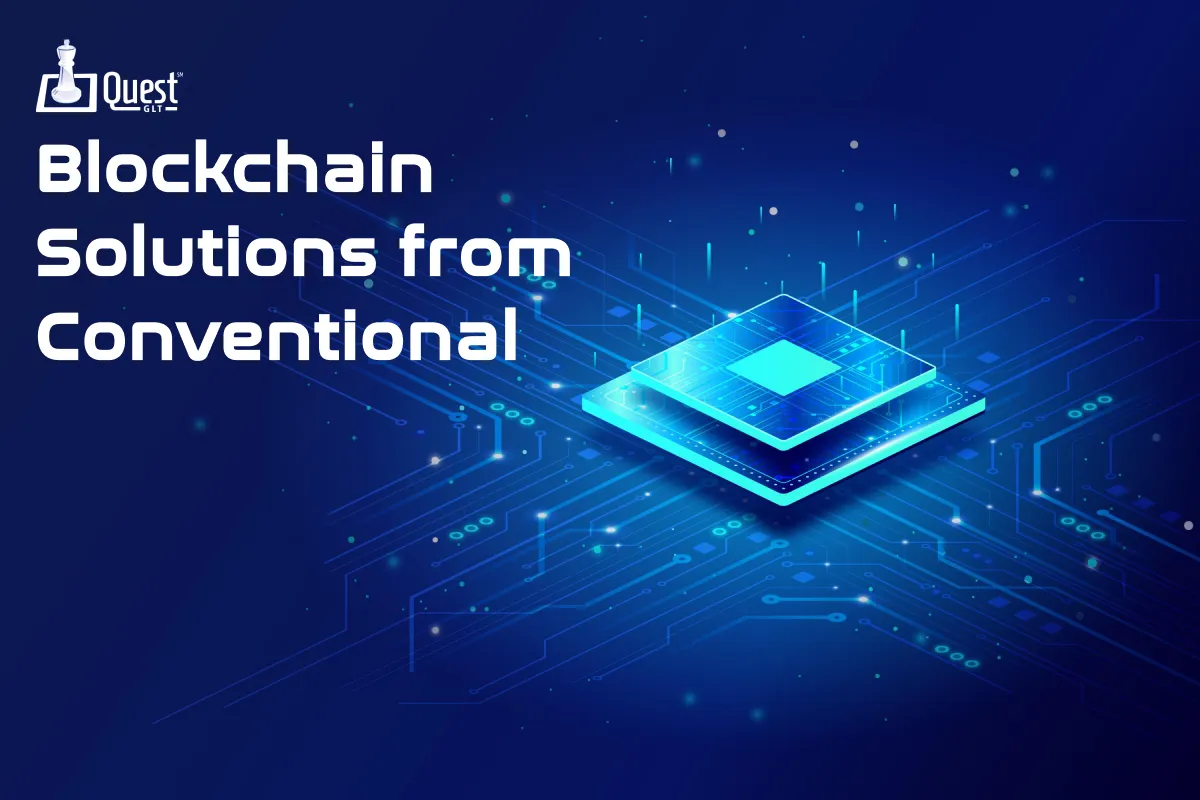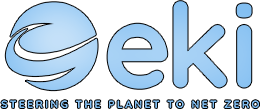
Blockchain solutions are universal in today’s world· Blockchain was once only used in the financial record-keeping industry, but it is now found in diverse fields· Ever wondered this - what differentiates Blockchain solutions from conventional record-keeping methods?
Developed in 1991, Blockchain acts as a secure storage for digital data· It uses a distributed ledger system to track asset changes along with the chain and record-keeping· According to the research, global spending on blockchain-based solutions is expected to soar from 3·7 billion in 2020 to 15·85 billion by 2024·
Read this blog thoroughly to understand the unique qualities and what differentiates Blockchain Development solutions from conventional record-keeping solutions·
Understanding Conventional Record-Keeping
The term "conventional record-keeping" describes the information management and documentation practices that were used before the development of sophisticated digital technology· Data in this system is usually stored on centralised servers, in physical forms, or centralised locations· The foundation of record-keeping in many different businesses was comprised of file cabinets, centralised databases, and paper documents·
Although these techniques have been useful for decades, but come with certain imperfections· One weak point in centralization is that it can allow the entire system to be compromised by a single point of failure· Furthermore, mistakes can occur in manual operations, and the absence of real-time updates might reduce productivity·
Transparency is a key component of conventional record-keeping systems which makes it difficult to track changes and ensure data accuracy· The more technology advances, the more important it is to recognise the limitations of these conventional approaches· This paves the way for investigating other approaches, like blockchain, that tackle these issues and reshape the field of record-keeping in the digital era·
Blockchain vs Traditional Database
Both blockchain and traditional databases define different strategies for data management and storage with unique features and applications for each·
Traditional databases, which have been in use for decades, are based on a centralized architecture where each entity holds control over data management· Their proficiency in managing organised data guarantees effective query processing and substantial transaction throughput· But because of their centralization, they are vulnerable to single points of failure and security flaws·
On the contrary, blockchain is a decentralized ledger technology, that operates on a dispersed network, guaranteeing that no one party has total control· It improves openness and trust by securing data using cryptographic techniques· Blockchain is especially well-suited for applications like supply chain management and cryptocurrencies because it performs best in situations where decentralisation, immutability, and transparency are crucial·
The concept of decentralization is where the key distinction lies· Traditional databases offer effectiveness in regulated settings, while blockchain creates a paradigm change by making trust possible in trustless systems· While traditional databases are still necessary for many applications, blockchain is the better option in situations when distributed data management, immutability, and transparency are required· This is because blockchain is safe and decentralised·
What Differentiates Blockchain Solutions from Conventional Record-keeping Methods?
Blockchain solutions differ from conventional record-keeping techniques in several ways that solve persistent challenges and provide new possibilities:
Decentralization:
As blockchain runs on a decentralized network, a central authority is not necessary· Centralized databases are frequently used in conventional record-keeping, they are vulnerable to manipulation and single points of failure·
Immutable Ledger:
Data stored on a blockchain is unchangeable and impervious to tampering· Adding a block to the chain makes it almost hard to change the data· In contrast, unauthorised alterations might be possible with traditional record-keeping methods·
Transparency and Trust:
Transparency is encouraged since every member of a blockchain network has access to the same data· Participants' trust is increased by this shared perspective on the data· Conventional systems could not be as transparent, which could cause disagreements and problems with trust·
Smart Contracts:
Smart contracts and self-executing agreements with coded rules are incorporated into blockchain technology· These contracts streamline operations by automating procedures, which decreases the need for middlemen· Traditional record-keeping frequently calls for human intervention and outside middlemen·
Security Through Cryptography:
Blockchain uses cryptographic methods to protect transactions and manage data access· This strong security system lowers the possibility of tampering or unauthorised access, improving data protection· Traditional security techniques could be used by conventional systems·
Global Accessibility:
Real-time updates and worldwide accessibility are made possible by blockchain technology· The blockchain facilitates global participation and access, making the system more open and integrated· It could be difficult for traditional record-keeping methods to provide instantaneous, worldwide access·
Elimination of Intermediaries:
Blockchain reduces or eliminates the necessity for middlemen in business transactions· This decrease in intermediaries not only expedites procedures but also lowers expenses· Conventional methods sometimes include several middlemen, which causes delays and higher costs·
Application Beyond Currency:
Blockchain was first used in the finance industry (for cryptocurrencies), but it has now spread to other sectors of the economy· Due to its flexibility, blockchain may be used in a variety of industries, including real estate, healthcare, and supply chain management· Traditional record-keeping systems might not provide the same degree of flexibility·
Overall, the decentralized, transparent, and secure nature of blockchain solutions, coupled with features like smart contracts and global accessibility, sets them apart from traditional record-keeping solutions· Due to this, blockchain is a revolutionary technology that can completely change several different sectors.
How Secure is a Blockchain Database?
One of the most secure options for data storage is a blockchain database which is known for its strong security measures· Blockchain’s security is greatly enhanced by its decentralised structure, which distributes data among a network of nodes· In contrast to conventional centralised databases, which have a single point of vulnerability, a Blockchain database necessitates the simultaneous compromising of many nodes, offering a strong resistance against assaults·
Cryptographic hashing is another essential component that improves Blockchain security· An interconnected chain is created because every block holds a hash of the one before it· Tampering is nearly impossible since modifying one block requires modifying all the following blocks· Furthermore, consensus techniques like Proof of Work or Proof of Stake guarantee node agreement before transaction validation, so incorporating an additional degree of security·
Additionally, data security is improved by the use of private and public keys in Blockchain transactions· Each participant has a unique cryptographic key, guaranteeing safe and authenticated network access· Smart contracts, which are self-executing contracts with rules encoded in them, safely automate tasks and lower the possibility of fraud·
Blockchain is quite safe, but it is not impervious to all attacks· Attacks on specific nodes or code mistakes in smart contracts might result in vulnerabilities· However constant improvements in security measures and close observation help to preserve Blockchain's standing as an extremely safe database technology that is relied upon by many different sectors to protect private data and transactions·
Benefits of Using Blockchain for Record-keeping
There are several benefits of using Blockchain for record-keeping, which transforms conventional practices and creates game-changing efficiencies:
Reduction of Costs:
By eliminating the need for intermediaries and labour-intensive manual verification procedures, blockchain technology makes cost reduction possible· Because smart contracts automate transactions, traditional record-keeping systems' administrative costs are decreased·
Enhanced Security:
The decentralised and encrypted structure of Blockchain provides heightened security· By using cryptographic hashes to connect each block, an immutable chain that is impervious to manipulation is produced· This increased security guards against data modification and unauthorised access·
Eliminating Errors and Mistakes:
Blockchain records' immutability reduces the possibility of mistakes and errors· Data cannot be changed backwards after it has been recorded without the network's participants' agreement· The precision and dependability of data are greatly increased by this feature·
Transparency:
By offering an immutable, shared ledger that is accessible to all parties, blockchain's transparency transforms record-keeping· As every transaction and change is traceable, guaranteeing accountability and lowering the possibility of fraud, this transparency promotes trust among stakeholders·
Limitations of Conventional Record-keeping Solutions
Centralization:
Centralized databases or physical repositories are frequently used in conventional record-keeping· Due to this centralization, there is only one point of failure in the system, increasing the risk of data leaks and other problems·
Susceptibility to Errors:
Human errors are a common occurrence in traditional record-keeping systems due to manual entry and processing· Errors in data input and computation can spread across the system and jeopardise the accuracy of information that has been recorded·
Lack of Real-time Updates:
Real-time updates may be difficult for conventional systems to supply· Decision-making procedures may be hampered by this information update latency, particularly in dynamic and fast-paced settings·
Limited Transparency:
It might be difficult to keep track of modifications in traditional record-keeping methods· Data integrity may be impacted by the inability to determine when and by whom changes were made in the absence of an open and traceable history·
Security Concerns:
The strong security features included in contemporary digital systems may not be present in traditional approaches· Centralised digital databases are prone to cyber attacks, whilst physical papers are liable to theft or damage·
Inefficiency in Retrieval:
It might take a lot of time and effort to locate and retrieve certain information from centralised databases or physical archives· The more data there is, the more obvious this constraint is·
Limited Accessibility:
In global or decentralised organisational systems, physical records or centralised databases may only be partially accessible· This may make it more difficult to collaborate and share information·
Blockchain Solutions Future
Mainstream Adoption:
Expect increased mainstream adoption across industries as companies begin to see the potential advantages of blockchain technology, which will result in a more extensive integration of this technology into daily operations·
Integration with Other Technologies:
Blockchain integration with cutting-edge technologies including edge computing, the Internet of Things, and artificial intelligence (AI)· The capabilities of blockchain are improved by this convergence, opening the door to more complex applications and solutions·
Enhanced Privacy Features:
Work on improving privacy features in blockchain systems will not stop· Zero-knowledge proofs and privacy-focused blockchains are two strategies that will allow consumers more control over their data and transactions·
Rise of Decentralized Finance (DeFi):
Decentralised Finance's (DeFi) rapid expansion is upending conventional financial services by providing decentralised options for borrowing, trading, and lending· It is anticipated that DeFi systems will advance in sophistication and accessibility·
Increased Integration of Smart Contracts:
The proliferation of smart contracts eliminates the need for middlemen by automating complicated commercial operations, across sectors· Smart contracts are going to be essential to many business endeavours·
Regulatory Clarity:
Advancements made in the areas of blockchain and cryptocurrency frameworks and regulations· More confidence in blockchain technology will be fostered by more stable business and investment environments brought about by clearer rules·
Social Impact:
More attention is being paid to using blockchain technology to support colonial effect projects including identity management in underprivileged areas, charitable donations, and supply chain transparency·
Environmental Sustainability:
Finding better environmentally friendly consensus techniques to solve issues with some blockchain networks' energy usage while maintaining a healthy balance between innovation & surrounding control·
How Diverse Industries Depends on Record-Keeping?
Healthcare Industry:
Maintaining patient health histories, treatment plans, & diagnostic records all depend on good record-keeping· By facilitating data accessible across healthcare providers, electronic health records, or EHRs, provides coordinated & effective patient care· Keeping accurate documents also helps with regulatory compliance & makes medical research easier·
Financial Services Industry:
Transaction histories, account statements, & regulatory compliance are all significantly reliant on record-keeping in the financial services sector· Financial transactions, investments, and client contacts are meticulously documented by banking organisations· Maintaining accurate and transparent records is essential for fraud prevention, auditing, and maintaining the integrity of monetary systems·
Manufacturing Industry:
In this sector, quality control, tracking inventory, and the production process are all very important, contributing to the overall efficiency of manufactories. Detailed records can assist these manufacturers in seeing where efficiencies, supply networks & required standards for product differentiation can be found. Thorough narratives also help when it’s time for an outcome recall or a company needs to be compliant with industry laws.
Legal Industry:
In this sector, management of records is essential to maintaining papers of court cases, client contacts, & case histories· Permitted professionals also maintain thorough logs to manage contractual agreements, assist litigation, & guarantee commitment to authorized norms· The integrity of official documents & the ability to construct solid lawful arguments both depend on the accurate record-keeping·
Education Industry:
Conserving academic credentials, tracking student progress, & assisting with administrative tasks are all reliant on proper record-keeping· The establishments keep track of students' attendance, grades, & accomplishments· Detailed document administration supports educational research, guarantees adherence to standards of instruction, & helps with accreditation processes·
Conclusion
I hope this blog will help you understand "What Differentiates Blockchain Solutions from Conventional Record-keeping Methods." As the administration of records moves from traditional ways to blockchain solutions, it marks a transformative journey· Blockchain technology offers unparalleled benefits across a range of sectors due to its decentralised, translucent, and secure characteristics, which distinguish it from standard systems· Future developments include privacy features, integration with developing technology, widespread use, & the emergence of decentralised money· With several businesses depending on accurate record management for productivity & legal compliance, the benefit of blockchain tech represents a significant change towards a digital environment that is safer, transparent, & more integrated·













